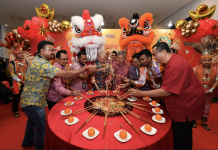BANGKOK, 20 August 2025: Thailand’s journey forward is powered by tourism, not only as an economic engine but also as a cultural force.
At its heart lies Thainess — the warm hospitality, Buddhist values, language, and traditions that shape both inbound and domestic tourism.

Campaigns such as “Thai Rak Thai” (Thai loves Thai), “Thai Tiew Thai” (Thai travel Thai), and “We Travel Together” have tapped deeply into this national identity, encouraging Thais to explore their own country while showcasing the kingdom’s soul to international audiences.
Tourism isn’t just an income stream; it’s the lifeblood of Thailand’s aspirations for the 21st century, funding infrastructure, transport, technology, education and a better quality of life for all Thais.
Under the stewardship of TAT Governor Thapanee Kiatphaibool, Thailand’s tourism sector is being reimagined with renewed energy, clarity, and unity. A famously fragmented industry, spanning planes, trains, hotels, catering, MICE, digital platforms, and cultural experiences, it is now moving in a common direction. Since assuming office, Governor Thapanee has brought not only creativity and cohesion, but also a pragmatic roadmap for collaboration between the public and private sectors.
Bringing industry voices together
Skål International Bangkok President James Thurlby highlights the need for cohesion and bold innovation: “With so much global potential, the key is to focus on unity and collaboration. We must support each other and use our collective strength to diversify markets.”

Governor Thapanee’s blueprint for progress centres on the “New Thailand” strategy, a bold framework built around five pillars: new customers, new products, new partnerships, new marketing, and new performance metrics. This modernised model encourages creativity, inclusion, and resilience, positioning Thailand as a premium, future-facing destination.
She has also been a driving force behind sustainability and environmental integrity. In close partnership with KHATA (Khon Thai Against PM2.5 and Air Toxicity Alliance), TAT is tackling challenges such as agricultural burning, smog pollution, and harmful carbon emissions. KHATA’s influence has been profound—not just in spotlighting urgent environmental concerns, but in reshaping how tourism fits into the national conversation on sustainability.
This extends beyond green practices to economic sustainability as well. Thailand can no longer afford to rely on outdated models like zero-rated commissionable tours, particularly from markets where the bulk of revenue generated is immediately repatriated. These mass-tourism models offer little value to Thai service providers, local communities, or the economy.
Critics and commentators agree that the shift away from these unsustainable practices is overdue. Among them, I add my voice, as a long-time tourism professional, that tourism is not just a key economic driver, but it is essential to Thailand’s national development. With tourism contributing over 20% of GDP, the sector plays a vital role in improving the quality of life for Thai citizens and in enabling the government to sustainably reinvest in infrastructure, healthcare, transport, education, technology, and digital communications.
Thailand must now attract high-value, high-net-worth travellers who seek and can afford elevated, meaningful travel experiences. From bespoke wellness retreats and curated cultural programmes to fine dining and private heritage tours, Thailand is exceptionally well-positioned to cater to this segment.
One of the most exciting developments is the revival of luxury rail travel. With the importation of historic Japanese train carriages, TAT and the private sector have aligned on a shared dream, bringing royal-style rail journeys to Thai tracks. The Red Blossom and Blue Train concepts represent a significant step forward in delivering immersive, high-end travel that celebrates Thai elegance, history, and service culture. This is more than transport, it’s destination storytelling on rails.
TAT’s Village to the World initiative also exemplifies inclusive innovation. In partnership with the Stock Exchange of Thailand and leading corporations, rural communities are being transformed via ESG* towards modern tourism models. Seven prototype provinces are already benefitting from this approach, connecting local tradition to global trends while creating stable economic opportunities for rural populations. (*ESG Environmental, Social and Governance – is a set of standards measuring a business’s impact on society, the environment, and how transparent and accountable it is.)
Meanwhile, the Amazing Thailand Grand Tourism & Sports Year 2025 campaign fuses tradition with energy, highlighting five celebration-based themes: Festivity, Moment, Privilege, Invitation, and Celebration. These themes not only appeal to global travellers, but they also resonate with Thailand’s natural strength – Hospitality infused with joy. Bangkok exemplifies this kudos and has always been a magnet for tourists. It’s the no.1 attraction.
In 2024, Bangkok welcomed 47.20 million visitors, 32.40 million international tourists and 14.80 million domestic travellers, offering a mix of affordability, multiple attractions, vibrant culture and diversity.
A foodies paradise, the Thai capital offers affordable travel experiences focusing on history and culture (temples, palaces, museums), excellent shopping and dining, a lively nightlife and a warm tropical climate. Its two international airports ensure the city leads as a crucial aviation gateway to exploring Southeast Asia and beyond.
Movies on location
The Location Thailand programme is equally impactful, turning film locations into travel landmarks. Major international productions, such as The White Lotus Season 3 and Jurassic World: Rebirth, are being filmed in destinations like Phuket, Trang, and Krabi, generating visibility and economic activity. With up to 30% cash rebates, Thailand is positioning itself as a global film tourism hub.
TAT’s financial ambitions match its creative ones. With a target of THB3 trillion in tourism revenue by 2026, the plan is supported by integrated planning across international and domestic offices, strategic air connectivity expansion, and renewed digital engagement through AI and innovative tourism platforms.
Significantly, TAT is also leading the country’s Carbon Neutral and Net Zero Tourism framework, in collaboration with TSRI (Thailand Science Research and Innovation) and other research partners. This commitment aligns with national sustainability goals and represents Thailand’s growing role as a model for climate-smart travel.
Thailand’s tourism strategy under Governor Thapanee is not about patchwork fixes; it is about full-spectrum transformation. One leader. One vision. One united direction forward.
About the author
Andrew J Wood is a respected travel writer, hotelier, and tourism lecturer with over four decades of experience in Southeast Asia’s hospitality and tourism sectors. A former general manager of several leading hotels in Thailand, Andrew arrived in Asia in 1991 at the Shangri-La Hotel Bangkok and has remained in Thailand ever since. He has worked with the Royal Garden Resort Group (now Anantara), the Landmark Group, and was General Manager at the Royal Cliff Group and Chaophya Park Hotels & Resorts. A regular speaker at international tourism forums, he is a past president of Skål International Asia, Thailand’s National President, and a two-time Past President of Skål International Bangkok.






